|
December 9, 2020 - No. 11
December 10 -- International Human
Rights Day
Respect for Human Rights --
The Starting Point of Any Society
Fit to Call Itself Democratic
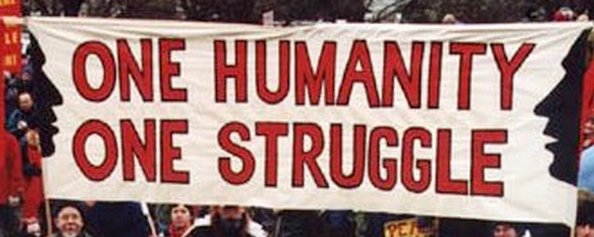
• The
Right to Conscience Is a Matter of Creating a
New
Society
- Pauline Easton
31st
Anniversary of the Polytechnique Tragedy
• End All Forms of
Violence Against Women! - Women's
Forum
Reinstate
the Moratorium on Deportations!
• Refugee Claimant
Advocates Decry Federal Government Decision to
Resume Deportations
- Diane Johnston
• Government's Inhuman
Justifications for Resuming Deportations
December 10 -- International
Human Rights Day
Canada
claims to be a model of equality and respect for
human rights despite
its increasingly blatant abuse of human
beings within the country
and internationally. Its practices are not only
harmful to those
directly impacted but reflect on the conscience
of society as a whole.
Take for example, the treatment of workers
during the pandemic, as
well as seniors in long-term care homes who are
treated as dispensable,
of homeless people where the police can raid
their tents and makeshift
shelters and burn their possessions with
impunity as took place in
Montreal this week, after the same thing was
condemned in Vancouver
this summer. They show the real blackheartedness
of the rulers who make
excuses for the current state of affairs and
disassociate themselves by
claiming it is another department which does not
concern them.
Statements about providing all First Nations
reserves with potable
water and safe housing are empty and
non-judiciable. These rights are
not recognized. Internationally, the enforcement
of U.S. imperialist
sanctions regimes are acts of war which lead to
devastating
humanitarian consequences for which the
government takes no
responsibility whatsoever.
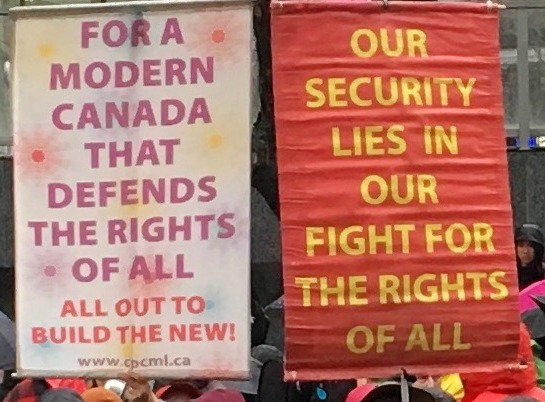 As the
anti-social offensive continues unabated, a
great deal of legislation is passed which
violates basic human rights. One does not hear
the government raising a hue and cry about this
-- it does not even recognize it. As the
anti-social offensive continues unabated, a
great deal of legislation is passed which
violates basic human rights. One does not hear
the government raising a hue and cry about this
-- it does not even recognize it.
On the contrary, its approach to everything it
does is to pay the rich. It considers all those
who fall victim to such a policy as less than
human. Once this is the case, to speak of
equality rights, minority rights, Indigenous
rights, women's rights, the rights of the child
or of the elderly or citizenship rights, privacy
rights and all other rights, is just noise. No
section of the population can be treated equally
when discrimination by virtue of everyone's
concrete reality is the rule.
Most importantly, the right to conscience,
recognized in the Universal Declaration of Human
Rights, is trampled in the mud as a matter of
course when human beings are not put at the
centre of a government's consideration. Ruling
elites in the service of narrow private
interests do all kinds of criminal things in the
name of rights: "national unity," freedom of
political opinion, the right of nations to
exercise their sovereignty, peace, democracy,
human rights. All kinds of balderdash is spoken
about in order to turn truth on its head. This
is an integral part of the crisis of credibility
and legitimacy the so-called democratic
governments are mired in.
The neo-liberal anti-social offensive has taken
the society in a direction opposite to that
required, one which recognizes the human rights
of all people. Its premise is that, as a norm,
only the claims of the tiny financial elite have
any legitimacy.
Without addressing this problem, the
celebration of International Human Rights Day
will not contribute to the cause of human
beings, let alone their rights.

- Pauline Easton -
Today Canadians are generally quite worried
about what is happening to societies all over
the world, their own included. They are given
the right to do, say and act in whatever way
they want so long as it has no consequences on
the rule which prevails over them. They can
choose whatever they want to purchase. They can
vote or not vote in any way they want. In this
way, freedom is described as consumer choice on
one hand, and political choice on the other.
Nobody has to listen to anyone they don't want
to listen to but, if they do something that the
ruling class deems does not benefit the narrow
private interest it enforces, they face what is
called "the full force of the law."
 In other words, a
marked feature of the present situation is that
governments which have no argument for the
terrible things they are doing, speak about
rights in the same fashion, as if they are
abstractions without consequences. In other words, a
marked feature of the present situation is that
governments which have no argument for the
terrible things they are doing, speak about
rights in the same fashion, as if they are
abstractions without consequences.
How is it possible to live a dignified life
when such a state of affairs exists?
A fierce battle is being waged between what is
progressive, positive and healthy and what is
retrogressive, negative and unhealthy. And
Canadians have to set their orientation in life
within these circumstances. They live in a world
in which classes exist and, thus, conflict is
certain to be found between the two ways and
outlooks which give rise to conflicting views
about practically everything.
Furthermore, in our society anarchy prevails in
different fields, especially in the economy,
which means that besides the policy of paying
the rich come what may, everything else is left
to chance. This includes how the younger
generations are cared for and nurtured, as well
as the elderly and those who require social
assistance and how all other aspects of living
are undertaken. What all of it reveals is that
those in positions of power cannot justify their
positions by sound logic and facts from life.
As a result, they find a rationale for doing
what they do in the abstraction. "In Canada, any
individual can do whatever she/he pleases," they
say. As if this supplants a substantive
discussion on what constitutes a democracy fit
for the times and how rights are defined, this
is used as the first and last word on the
matter.
There is no evidence to back up this assertion.
There can never be a society where an individual
can do whatever she or he wishes, because the
very existence of society imposes definite
limitations on its members. We create our own
society, but it isn't created according to our
every wish. Nor can we say that we have no say
whatsoever in its creation. Thus, the argument
that an individual can do anything she or he
wishes is either a mere abstraction, a profound
detachment from life, a negative and unhealthy
opinion or an impossibility.
Writing for the New Magazine in
September 1987, a period when the conscience of
society was based on arrangements of a social
welfare state that were being pushed aside by
the onset of neo-liberalism -- called
neo-conservatism in those days -- the editor B.
Paul wrote[1]:
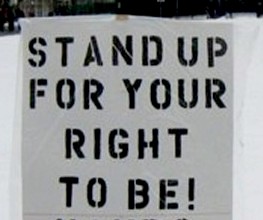 "The right to
conscience, to hold opinions, to advocate and to
practice them is a fundamental right. And this
right is not merely an idea, an intellectual
exercise. Take, for example, a worker who is
conscious of his conditions of life and
advocates that the capitalist system must go.
Why would he do such a thing? Because only in
this way can he see his interests served and his
future guaranteed. Such a worker instinctively
gravitates towards socialism, while a capitalist
would consider it a mortal sin even to think of
overthrowing the capitalist system." "The right to
conscience, to hold opinions, to advocate and to
practice them is a fundamental right. And this
right is not merely an idea, an intellectual
exercise. Take, for example, a worker who is
conscious of his conditions of life and
advocates that the capitalist system must go.
Why would he do such a thing? Because only in
this way can he see his interests served and his
future guaranteed. Such a worker instinctively
gravitates towards socialism, while a capitalist
would consider it a mortal sin even to think of
overthrowing the capitalist system."
By law, the demand is enforced that all future
citizens swear allegiance to Canadian
institutions, that is, to the society which is
constructed on the basis of a pay-the-rich
economy and which belongs to the aggressive U.S.
imperialist military alliance NATO. This is the
Citizenship Act which only applies to
permanent residents who want citizenship, not to
born Canadians.
Born Canadians are, nonetheless, also treated
as legitimate or illegitimate beings according
to whether they support what are called Canadian
values as represented by the so-called liberal
democratic institutions. It shows that the
government wants to preserve the pay-the-rich
system and enforce the status quo while, at the
same time, claiming that a person can believe
whatever she or he wishes so long as she/he
swears allegiance to "our way of life." B. Paul
writes:
"The question of conscience is a question of
science and civilization, of the well-being of
the people, of freedom and progress, of the
advance of society. It is not fortuitous, then,
that only progressive people deal with the
question of conscience in a sincere, open and
honest manner. It is a broadly accepted view
that freedom is the recognition of necessity.
Can our conscience be independent of this?"
The Government of Canada takes a position on
rights and human rights in particular, which
clearly suggests that yes indeed, rights are an
abstraction. Our consciousness of what
constitutes a right must be framed by the
anachronistic liberal democratic institutions.
Ours is to merely repeat some version of what
they tell us. If we fail to abide by this
dictate, we are extremists of some sort and
worthy of exclusion, defamation and civil death,
in other words, we are criminalized.
B. Paul raised the following for consideration:
"What is necessary now is that a new society be
created which does not have the evils of
capitalism. What kind of conscience is it that
does not recognize this?"
This means that today, the clashes around the
question of conscience, outlook and conduct in
life are not only very fierce but have a sense
of urgency. Everyone has to make up their minds
about the direction society is to take and
everyone has to take concrete actions which lead
it in that direction.
This is also the case of the younger
generation. Young people deeply feel the need to
decide how to orient themselves. This
preoccupation drives some to nihilism, fatalism
and tragic consequences. It drives others to
take up revolutionary positions. The same is the
case with the workers, especially young workers,
from coast to coast. It underscores the
significance of the question of conscience.
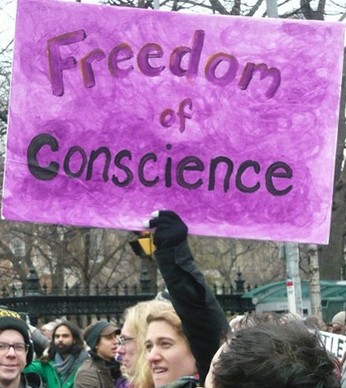 While governments
and establishment forces including media,
universities, think tanks and spokespersons for
all manner of business interests and social and
charity organizations claim that in Canada the
right to speak freely is protected, the most
important issue here is the denial of the right
to conscience. It is not possible to have the
right to conscience when those who are the
enemies of this right have such power. While governments
and establishment forces including media,
universities, think tanks and spokespersons for
all manner of business interests and social and
charity organizations claim that in Canada the
right to speak freely is protected, the most
important issue here is the denial of the right
to conscience. It is not possible to have the
right to conscience when those who are the
enemies of this right have such power.
Nobody can accuse the likes of Joe Biden,
Justin Trudeau, Chrystia Freeland, Irwin Cotler
or Jason Kenney of being men and women of
conscience. This is not because they are
reactionary politically, but because their very
conception of the present-day world leaves the
question of conscience in the Middle Ages. The
question of conscience can never be reduced to
the right to counterrevolution and reaction.
"Conscience and science, conscience and
progress, conscience and revolution -- these
have much in common," wrote B. Paul. "One cannot
see one without the other. [...] Those who try
to justify self-serving and self-destructive
attitudes do so only at the cost of conscience.
Having no conscience is tantamount to
deliberately denying human values and
civilization, to support blindness and inhuman
behaviour," he added.
B. Paul pointed out that prejudice has nothing
to do with conscience. "It so happens that
because everyone is a product of society, they
feel as if their views and conscience are well
worked out and looked after. But conscience
demands a fully conscious and wholly justified
view on the basis of science and entirely in the
interests of freedom and progress. Just because
we have picked up some things spontaneously does
not yet make us men and women of conscience. It
does not matter how many times it is repeated,
it will simply not wash. We stand for a very
definite conscience. This definitiveness comes
from the concern and needs of the people. Our
conscience is neither vague nor fleeting and
transitory. It is rooted in the very soil of the
human advance to create a society where
everything blind and backward becomes a thing of
the past."
B. Paul stated the conclusion succinctly: "The
right to conscience, then, is the question of
creating a new society."
Note
1. "On the Question
of Conscience," B. Paul, The New Weekly
Magazine, October 14, 1987.

31st Anniversary of the
Polytechnique Tragedy
- Women's Forum -
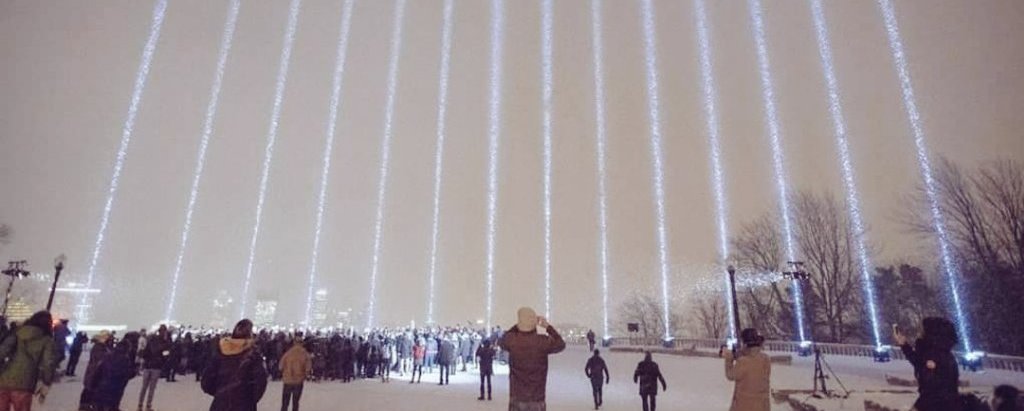
December 6, 2020 marked the 31st anniversary of
the École Polytechnique massacre in Montreal,
one of the most tragic events to have struck
Quebec and Canadian society. On December 6,
1989, an individual opened fire on 28 people,
killing 14 women and injuring 10 other women and
four men, before committing suicide himself. At
least
four people have ended their lives as a result
of this tragedy.
It is to the credit of women and their
organizations that on this occasion they
reiterate their demand for the elimination of
all forms of violence against themselves and
their children, as well as in all of the
society. The 12 Days of Action Against Violence
were launched in Quebec on November 25,
International Day for the Elimination of
Violence against Women, as well as the 16 Days
of Action internationally from November 25 to
December 10, International Human Rights Day.
Despite the pandemic, virtual meetings on
Facebook, vigils, book launches and other
activities are taking place during this period
to remember and examine the struggle within
today's conditions.
Women's starting point is not the self-serving
viewpoint of governments which feebly oppose
violence against women by presenting it as a
matter of behaviour, to better pursue with
impunity their neo-liberal anti-social agenda of
destruction and violence against society. They
reject this hypocritical vision that permits the
conditions which
contribute to violence against women to
continue. Women and progressive forces are
waging a courageous and inspiring battle,
demanding that the government assume its social
responsibility towards them. In order to combat
all forms of violence, it must guarantee their
rights to security, housing, health care and
education, including child care,
along with all the necessary resources to combat
all forms of violence. Women and the society
have every right to demand a responsible
society. As full-fledged members of the society
and to fully participate in all spheres of life,
women are fighting for the living conditions
they deserve. This is all the more inspiring
within the context of
the COVID-19 pandemic, with all its imposed
containment and isolation, and political,
social, cultural and economic degeneration
within society.
The organization of the 12 Days of Action in
Quebec notes: "Months of a pandemic and weeks of
quarantine in the Spring of 2020 have brought
out violence that we thought was in the past.
Other acts of violence have worsened,
intensified, and transformed: Gender-based and
sexual violence, but also the violence of not
being seen or heard. The
impact of this systemic violence is felt among
all women, including among Aboriginal women,
health workers, among national minority and
immigrant women, among LGBTQ + people, among
women with disabilities, among women confined,
incarcerated, without status, sex workers, and
among homeless women.
"As forms of violence multiply, the barriers to
access to services are rising and have shown us
how no right or form of protection should be
taken for granted. And this systemic violence
persists all the more insidiously as it grows in
silence."
A Behavioural Problem, Says the Trudeau
Government
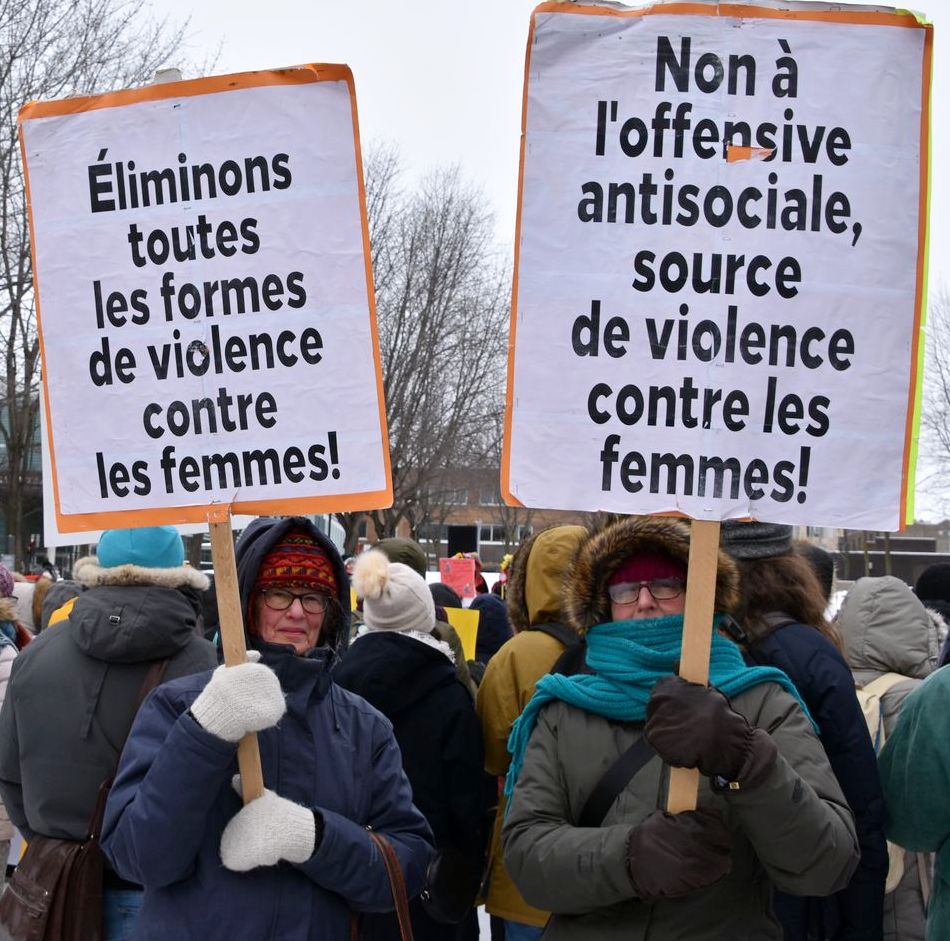 Prime Minister Justin Trudeau and
the Minister of Crown-Aboriginal Relations,
Carolyn Bennett, stood up during the first week
of December to spew out the worst absurdities
and hypocritical statements about Indigenous
women, so-called racialized national
minority women, and the most vulnerable. The
more they name and categorize women, the more
they marginalize and dehumanize them. Minister
Bennett called on Canadians to take action if we
witness violence against women, to give time and
money to non-governmental organizations working
to end violence, saying that racialized women,
LGBTQs, Indigenous women, etc. need us and are
counting on us. Prime Minister Justin Trudeau and
the Minister of Crown-Aboriginal Relations,
Carolyn Bennett, stood up during the first week
of December to spew out the worst absurdities
and hypocritical statements about Indigenous
women, so-called racialized national
minority women, and the most vulnerable. The
more they name and categorize women, the more
they marginalize and dehumanize them. Minister
Bennett called on Canadians to take action if we
witness violence against women, to give time and
money to non-governmental organizations working
to end violence, saying that racialized women,
LGBTQs, Indigenous women, etc. need us and are
counting on us.
In her intervention, there is an "us" and a
"them" and the role of the "us" is to help, to
be aware of violence, to raise our voices, to
give money and to become volunteers. As if women
as a collective does not exist, nor the
government's social responsibility to ensure the
well-being of all.
For his part, Justin Trudeau reduced violence
to a matter of misogynistic behaviour and said
that women "should not have to be afraid to
succeed, to be ambitious or to advocate for a
better future. Gender equality is
non-negotiable, now and forever."
The problem of equality is not an abstraction
as the Prime Minister suggests. The reality is
that those who govern are not equal to those who
are the victims of their governments.
He spoke about violence during the pandemic:
"It has been difficult for everyone, so imagine
how much harder it has been for those who do not
feel safe at home, but do not feel like they
have anywhere else to go. It is a simple fact.
Gender-based violence has been made worse by
this pandemic. That is unacceptable." He
announced a
never-ending action plan on gender-based
violence. "We are ready to do that [...] work
alongside advocates, volunteers and all those
who are fighting for change," he said. However,
he made sure to keep silent about the violent
and unsustainable working conditions facing
women, including nurses, teachers, daycare
workers and all women working
in services, to name but a few, who are not
included in his so-called national plan on
gender-based violence.
He unabashedly spoke of the assault weapons
lobby, saying "there is no place in our country
for weapons designed to kill the largest number
of people in the shortest amount of time." This,
despite the fact that his government is actively
involved in weapons and war procurement as well
as the aggressive and military activities of
NATO as a
member. From November 20-22 in Halifax, for a
12th consecutive year, Canada hosted the Halifax
International Security Forum, hosted by NATO and
supported by the world's largest arms dealers
and other private interests that demand
increased military spending, intensified war
preparations and control of all interests that
oppose their own. In
that forum, the enhancement of women's
recruitment into the army and in so-called
leading positions to deploy our youth as cannon
fodder was discussed. Canadian foreign policy is
a pro-war policy marked by interference,
intrigues against Venezuela on the eve of the
December 6 election, support for the repressive
and corrupt government of
Haiti, and refusal to condemn the repression in
Chile. These are all "gestures or words" that
permit the worst violence against women.
Women in the Forefront of the Struggle to
Eliminate Violence
Against Themselves and Their Children
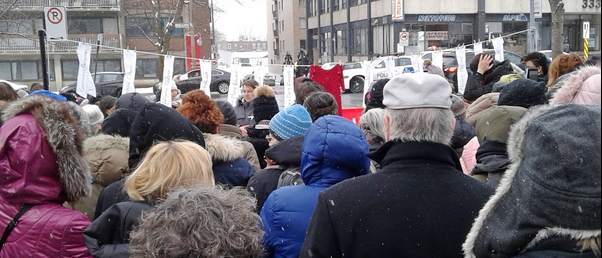 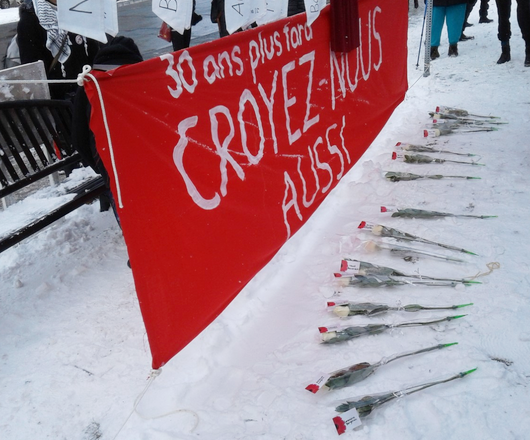 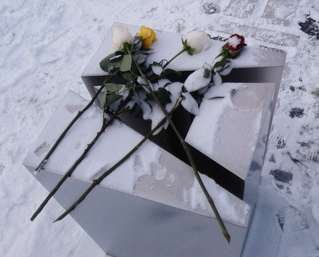 December 6, 2019. Commemoration in
Montreal on the occasion of the 30th anniversary
of the École Polytechnique tragedy, at Place du
6-décembre-1989. December 6, 2019. Commemoration in
Montreal on the occasion of the 30th anniversary
of the École Polytechnique tragedy, at Place du
6-décembre-1989.
Women's experience and struggles are light
years away from government discourse, which no
longer fools even the most gullible. For a long
time now they've been speaking out in their
marches, speeches, demonstrations, demands and
petitions for the elimination of all forms of
violence. They demand a change in the direction
of the economy
towards a pro-social direction that requires new
arrangements and the renewal of institutions
that no longer function and are blocking
society's advance.
Women are fighting for decision-making power
so as to humanize society. A process is in place
which is blocking discussion in order to keep
women at the mercy of governments which are
depriving the people of decision-making power
that would enable them to end all forms of
violence and to exercise control over all issues
of concern to
them. Women require new arrangements when they
call for massive investments in health care,
education and social programs, women's rights
organizations, shelters, as well as when they
call for an end to the ongoing violence suffered
by women, especially Indigenous women, thousands
of whom have gone missing or have been murdered.
On this 31st anniversary of the Polytechnique
tragedy, we pay tribute to the 14 young women
who lost their lives: to Geneviève Bergeron,
Hélène Colgan, Nathalie Croteau, Barbara
Daigneault, Anne-Marie Edward, Maud Haviernick,
Maryse Laganière, Maryse Leclair, Anne-Marie
Lemay, Sonia Pelletier, Michèle Richard, Annie
St-Arneault,
Annie Turcotte and Barbara Klucznik-Widajewicz,
to the missing or murdered Indigenous women and
to the thousands of women and children who have
been victims of violence in all its forms. We
continue the struggle for its elimination!

Reinstate the Moratorium on
Deportations!
- Diane Johnston -
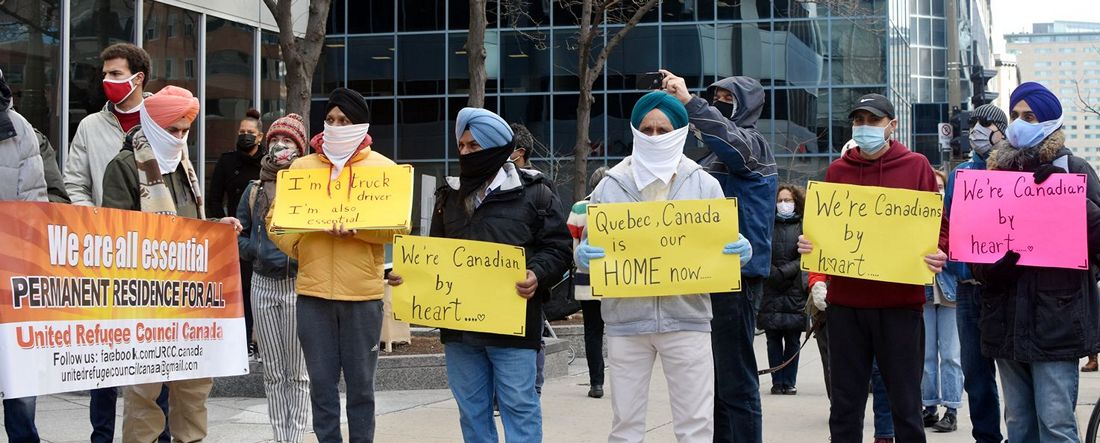
November 21, 2020. Picket in Montreal for
permanent resident status for all.
Advocates for failed refugee claimants and
other non-status workers are condemning the
Trudeau Liberal government's decision to resume
the deportation of asylum seekers whose claims
have been rejected, many of whom have been
working in health care as well as other
essential services during the COVID-19 pandemic.
The Canada Border Services Agency (CBSA)
informed immigration lawyers by email that the
agency would resume deportations, on which there
had been a moratorium since March 17, as of
November 30.
 A very restricted
pan-Canadian special program, announced on
August 14 by the federal and Quebec governments,
which was to "provide a pathway to permanent
residency for asylum claimants," has yet to see
the light of day. The program only applies to
nursing attendants and orderlies providing
direct care to those infected with COVID-19, as
long as they meet all the program's
requirements. Even though the program was set up
by the federal and Legault governments in
response to broad public appreciation of these
workers, it is the Legault government that will
have the final word on who in Quebec gets
accepted into the permanent residency program. A very restricted
pan-Canadian special program, announced on
August 14 by the federal and Quebec governments,
which was to "provide a pathway to permanent
residency for asylum claimants," has yet to see
the light of day. The program only applies to
nursing attendants and orderlies providing
direct care to those infected with COVID-19, as
long as they meet all the program's
requirements. Even though the program was set up
by the federal and Legault governments in
response to broad public appreciation of these
workers, it is the Legault government that will
have the final word on who in Quebec gets
accepted into the permanent residency program.
In a recent email to the media, a Quebec
immigration department spokesperson stated that
the program is expected to come into effect over
the winter and that the details of how it will
apply in Quebec will be announced "shortly."
Frantz André from the Action Committee on
Non-Status Persons (CAPSS) says that the
decision has only exacerbated the vulnerability
of essential workers dubbed "guardian angels" by
Quebec Premier François Legault. "So, we're
starting [deportations] three weeks before
Christmas, when the program and the details of
the special program for asylum seeker orderlies
have yet to be announced," he said, adding, "I
call this criminal. This is not right!"
André also noted that the announcement of the
resumption of removals has left many feeling
fearful and unsure about whether they qualify
for the special program. He went on to say that
some of these workers who could have been
eligible have given up and decided to leave
Quebec and that others have contemplated
suicide.
He says the deportation orders should be
suspended until it becomes clear who is eligible
for the program. In his opinion, all asylum
seekers who have been in the country since the
pandemic began deserve to stay. "I think they
all have contributed, economically, to saving
lives, and Canada is better thanks to these
people," he said, adding that their contribution
has shown that far from being a burden to
Canada, they are a gift.
Wilner Cayo, President of Debout pour la
dignité (Stand Up for Dignity) continued in the
same vein, noting that the uncertainty is
causing those who continue to work to ensure
their survival "enormous anxiety."
Cayo also remarked that the forever elusive
program fails to address the situation facing
other essential workers, including security
guards and cleaning staff in care homes, truck
drivers working in food production, etc.
The head of the Quebec Association of
Immigration Lawyers (AQAADI), Guillaume
Cliche-Rivard, declared that the Canada Border
Agency's announcement was "very bad news" and
will only add to the anxieties of refugee
claimants. "This means that people who were
waiting and hoping for the regularization of
their status, some through the program aimed at
guardian angels, could be removed beforehand,"
he said. "These people play an important role in
all sectors of our society. This includes such
people as security agents who keep watch over
our health care establishments or those who
clean our CHSLDs [long-term care centres] who
are not included in any [regularization]
program, but who we cannot afford to lose."
 In his opinion,
just weeks before the holidays and right in the
middle of this second wave of the pandemic, the
time chosen to resume expulsions could not have
been worse. "We are smack in the middle of an
upsurge, with 1,400 cases per day. To suggest
that we are in a position to let some of these
people go seems completely absurd to me," he
stressed. "The same government which is telling
us not to go out and to avoid air travel is also
telling us that it will be deporting people to
their countries." In his opinion,
just weeks before the holidays and right in the
middle of this second wave of the pandemic, the
time chosen to resume expulsions could not have
been worse. "We are smack in the middle of an
upsurge, with 1,400 cases per day. To suggest
that we are in a position to let some of these
people go seems completely absurd to me," he
stressed. "The same government which is telling
us not to go out and to avoid air travel is also
telling us that it will be deporting people to
their countries."
Guillaume Cliche-Rivard also remarked that the
CBSA, under the responsibility of Public Safety
Canada, has no specific information on a person
being deported, such as what their job is. "The
agency doesn't know what work these people do.
Even if these procedures were suspended for
certain people working in essential services,
legally nothing prevents the expulsion of an
orderly."
He called on the CBSA to immediately reinstate
its moratorium on deportations.
"Given the pandemic, we're putting these
people's health at risk by throwing them out,"
said Quebec immigration lawyer Stéphane
Handfield. "This is a world pandemic. Why is the
CBSA doing this now? It doesn't make sense."
For Marjorie Villefranche, Director General of
la Maison d'Haïti and Co-Spokesperson of the
Coalition for the Regularization of Status, the
announcement comes as no surprise. "They choose
a time when people will not be paying too much
attention," she said. "That's what they usually
do. It's just before Christmas and people are
busy with other things," she added. "What this
means is that people who are refugee claimants,
the very people who could have had their status
regularized, are at risk of being deported."
Villefranche is also concerned that persons who
provided direct care to patients may be deported
before the regularization program sees the light
of day, along with some 5,000 rejected refugee
claimants already in the country who could have
been included in the special program if it had
been expanded to cover all essential service
workers.

At the very end of November, the Canada Border
Services Agency (CBSA) began notifying
immigration lawyers that as of November 30 it
would resume deportations. The expulsions had
been on hold since March 17.
CBSA Director of Enforcement Chris Lorenz sent
an email indicating that following consultations
with Health Canada and the Public Health Agency
of Canada, removals were to begin once again. He
added that deportees would be provided with
non-medical masks, gloves and hand sanitizer
during the trip.
"The decision was made taking into account the
various global factors with respect to COVID-19,
such as a gradual reopening of countries, the
emergence of viable vaccination options, and
coordinated strategies amongst countries and air
transport companies to mitigate possible
transmission," Lorenz wrote.
He also noted that the decision to halt most of
the removals during the pandemic "was an
exceptional measure that was not shared by the
international community."
"The timely removal of failed claimants plays a
crucial role in supporting the integrity of
Canada's asylum system," the CBSA said in a
statement, adding that it "has the legal
obligation to remove individuals who have no
legal right to stay in Canada as soon as
possible."
The federal government has said it will
continue to make exceptions for claimants from
14 countries where it claims their safety could
be jeopardized.[1]
CBSA spokesperson Rebecca Purdy said that "the
agency will not be removing those who may be
eligible to qualify for permanent residency
under the guardian angels public policy." The
program, announced on August 14, has yet to be
finalized. She added that the number of
deportations will "continue to be significantly
reduced for some time, and all individuals will
continue to have access to all recourse they are
entitled to under the law."
Officials from Immigration Minister Marco
Mendicino's office also confirmed that those who
may be admissible under the special program
would not be deported. "We can guarantee that
with regard to these people, there will be no
removals" officials said, confirming that they
are working in collaboration with the Ministry
of Public Security, in charge of deportations.
However, they added that they "cannot guarantee
that security agents or cleaning women will not
be deported."
Note
1. Afghanistan, Burundi,
Central African Republic, Democratic Republic of
the Congo, Gaza Strip, Haiti, Iraq, Libya, Mali,
Somalia, South Sudan, Syria, Venezuela, Yemen.

(To access articles
individually click on the black headline.)
PDF
PREVIOUS
ISSUES | HOME
Website: www.cpcml.ca
Email: office@cpcml.ca
|

